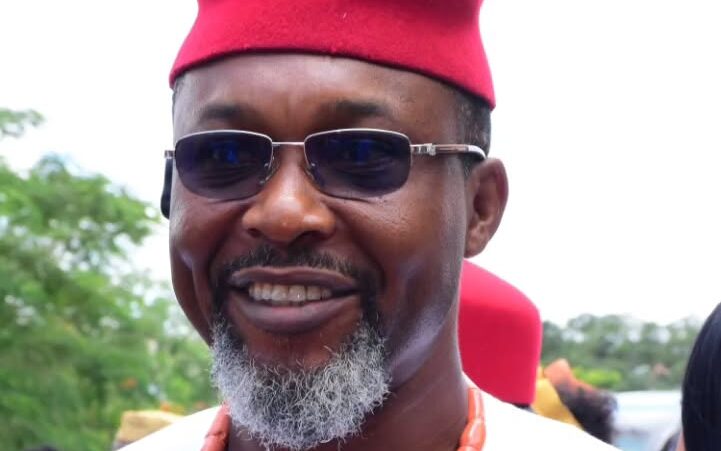Osimhen Top Transfer Targets for European Giants in Summer
Osimhen Top Transfer Targets for European Giants in Summer
NDSF: Edo Tasks its Contingent to be Good Ambassadors in Uyo
NDSF: Edo Tasks its Contingent to be Good Ambassadors in Uyo
Saka Scores on Comeback from Injury as Arsenal Beat Fulham
Saka Scores on Comeback from Injury as Arsenal Beat Fulham
ON THE HOME FRONT
ON THE HOME FRONT
NAFIU ABU-AKBAR reckons that Abubakar Atiku Bagudu left an enviable track record in Kebbi State
When Senator Abubakar Atiku Bagudu was sworn in as the Governor of Kebbi State in 2015, though a man of an enviable track record, little did many think he was going to build a better, prosperous, and self-reliant state that would be a model not only in the North but throughout Nigeria. He was so people-oriented in his first term that the idea of him continuing for another tenure was served on a gold platter- and as a faithful servant leader, he didn’t disappoint.
Before he emerged as Governor, Kebbi State, known as the ‘Land of Equity’, had been underdeveloped since its creation in 1991, largely due to the meagre resources at the disposal of the various governments. However, like a substitute player who had waited for his time, Bagudu came and energetically transformed the state’s fortunes—achieving reasonable development, especially in the state capital, Birnin Kebbi.
A master strategist, Bagudu understood that to attract investments to the state, he needed to bolster public-private partnerships, and this he did by creating an enabling business environment. He started by positioning the state for success with a special focus on developing the state. With limited resources available, he began to unlock the doors of productivity and growth through the provision of infrastructure to boost the economic activities of small-scale and medium-scale businesses in the state. Within a three-year period, the fortunes of a once-underdeveloped state began to change for the better. Slowly and steadily, people saw the reality of their dreams, beliefs, and confidence in Kebbi as the ‘Land of Equity’ being restored, and the scales began to balance.
The catalyst that set the change in motion was sparked by massive road construction projects in all 21 local government areas of the state. He matched road accessibility with the provision of power, ensuring that the people enjoyed more than 22 hours of uninterrupted electricity supply. This feat was possible because of the purchase and installation of two 7.5KVA transformers at two strategic locations in the city and more than 35 2.5KVA transformers to boost supplies from the two transformers. This improved the security, entrepreneurship and well-being of the people because major streets within the state capital were always lit, many thanks to the installation of street lights.
With various projects inaugurated in all the 225 wards across the state, from road construction and water supply to construction/rehabilitation of schools and health centres, Bagudu had already set the tone for an enabling business environment, a verifiable invitation that birthed an investment drive and private sector entry into the state.
The benefits of the infrastructural development had started trickling in with the flourishing of large and medium-scale businesses across the state, contributing to job creation, thus reducing poverty restiveness and bolstering food security. GBFoods, makers of Gino tomato paste and Mayonnaise, Bama and Jago varieties, have their presence in the state, as shown by establishing a tomato paste factory in Gafara Village of Ngaski LGA. The factory is the second largest in Nigeria, with the largest single tomato farm and the only fully backward integrated plant in the Economic Community of West African States (ECOWAS). Other private investors are the Dangote Group of Companies, which has sugar and rice production factories worth $700 million, providing over 75,000 direct and indirect jobs for people of the state and beyond.
The agricultural revolution grew stronger with other prominent investors like Labana Rice Mill Limited and WACOT Rice Limited with rice mills in Birnin Kebbi and Argungu, respectively, along with others scattered across the state. This led to an improved standard of living with the massive employment of youths and women in the agricultural sector. The list included the Kebbi/NNPC Ethanol Project in Zuru Emirate, the signing of many workable and plausible Memoranda of Understanding (MOUs) with renowned international organisations, including the World Bank, CBN, UNICEF, United Nations Industrial Development Organization (UNIDO). A partnership between the Kebbi State Government and the United States African Development Foundation (USADF) and the Kebbi State Government strategic partnership for $10 million in enterprise investment cooperation.
True to his promise of welcoming investment that would create wealth and generate employment for the people, especially the youth, Atiku Bagudu always supported entrepreneurs during his time at the helm in Kebbi. At the commissioning/ opening ceremony of a hospitality business, Nugget Continental Hotel and Tours, Birnin Kebbi, the former governor, declared, ‘ It is consistent with our view that the private sector should lead the development and the role of government is to help private sector make a profit.’
This mindset oiled his wheels of progress as a pacesetter and trailblazer in policy and development works. The flag-off of the Presidential Artisanal Gold Mining Development Initiative (PAGMI) in Kebbi, as one of the pioneer states in 2020, underscored Bagudu’s economic transformation thrust and investment drive. His government partnered with the miners to promote legitimate and safe mining practices, including financial support and technical assistance. An unprecedented success was recorded in the solid minerals sector when President Muhammadu Buhari was presented with the first artisan ally mined gold bar sourced from PAGMI artisanal miners in the state. The initiative, which is the brainchild of the Solid Minerals Development Fund, continues to provide job opportunities for the teeming youths with adequate security and protection for the miners and the environment.
Agriculture, one of the major occupations of the people in the rural areas of Kebbi, witnessed tremendous growth under Atiku Bagudu with the influx of foreign and local investors. The sky-high rice pyramids instantly ignite memories of the groundnut pyramids of Northern Nigeria of the ’60s; this symbol of agricultural wealth sparks the hope that a prosperous Nigeria is possible with people like him at the helm. Beyond the influx of private investors, a landmark achievement in the rice value chain was the CBN Anchor Borrowers Program launched by former President Muhammad Buhari in 2015 in Kebbi.
Atiku Bagudu, putting on his hat of accountability, supported the programme wholeheartedly by providing logistics support to the Anchor Borrowers Program committee as they went about the 21 LGAs capturing the bio-data of all genuine benefiting farmers in order to certify that only genuine smallholder farmers got the loan. The program thrived in Kebbi so much that it revolutionised rice production not only in the state but all over Nigeria. It was a success that earned Bagudu the title “Ambassador of rural economic transformation” from the former president.
On the education front, his administration strengthened primary education as it believes foundational education is the cornerstone of any society. In 2016/2017, the Kebbi government released N4.6 billion as counterpart funding for executing Universal Basic Education (UBE) projects to improve primary school education across the state.
This ensured that during his tenure, projects were executed under the UBE scheme, which included constructing and rehabilitating classrooms, providing furniture, computers, and accessories, and building perimeter fencing for these schools. He also ensured that strategies were implemented to improve the standard of teaching and learning in primary schools and boost teachers’ welfare across all of Kebbi State.
Looking back at these monumental strides towards the industrialisation of a state with limited resources, it is safe to acknowledge the visionary leadership of Atiku Bagudu, who understands the enormous potential of the private sector and tapped into it to make Kebbi a one-stop hub for business investment in Nigeria. Fair to him and every administration member, he left Kebbi State better than he met it. He closed the infrastructure deficit and attracted private investors while opening up opportunities for developing human and natural resources that propelled Kebbi State to greater heights.
Abu-Akbar, a Social Worker writes from Birnin Kebbi
NAFIU ABU-AKBAR reckons that Abubakar Atiku Bagudu left an enviable track record in Kebbi State When Senator Abubakar Atiku Bagudu was sworn in as the Governor of Kebbi State in 2015, though
NWOSU AND THE SENATE’S AMNESIA
NWOSU AND THE SENATE’S AMNESIA
Humphrey Nwosu deserves a national honour, argues PAT ONUKWULI
Memory is a stubborn witness; it holds on to the truth even when power tries to bury it. When the Nigerian Senate dismissed a motion to posthumously honour Professor Humphrey Nwosu, the man who midwifed the June 12, 1993 election, it did more than forget a hero; it passed a quiet but damning judgement.
In questioning the worth of his sacrifice, the Senate didn’t just ignore history; it tried to rewrite it, serving as a bitter adumbration of its gavel; that honour, like justice, is too often filtered through the lens of region, bias, and convenience.
Professor Nwosu is a name that cannot be whispered around the corridors of Nigerian history without evoking the date of Nigeria’s most credible, free, and fair election. He was the brave umpire who dared to conduct an election under the looming shadow of a brutal military regime. While soldiers patrolled the streets and the drums of dictatorship thundered, Nwosu stood firm, announced the results against direct orders, and etched his name in the ledger of integrity.
And yet, when the question came to honour him, not with gold or land, but with a simple posthumous acknowledgement, many senators shrugged. Some claimed he merely did his job. Others argued his efforts were not “good enough.” But not one of them could point to a singular wrong he had done. Then one wonders from where the senators are coming. Did their decision come from moral principles or perhaps from distorted or prejudiced convictions?
The refusal to honour Nwosu is akin to watching a firefighter run into a burning house to save a child, only to tell him afterward, “Well, that was your job.” Such reasoning strips courage of its meaning. Nwosu didn’t just clock in for duty; he stood firm in the face of a powerful military regime, risking his safety to uphold the integrity of an election that symbolised hope for millions.
To reduce his bravery to mere obligation is to ignore the extraordinary in favour of the convenient. Nwosu was not merely a technocrat doing his job. He was a man who dared to tell the truth in the belly of dictatorship.
Maya Angelou observed that “prejudice is a burden that confuses the past, threatens the future, and renders the present inaccessible.” The Senate’s decision quietly echoes this burden.
In questioning the merit of a man who presided over the nation’s most credible election, the Senate may have allowed regional and political sentiments to obscure a moment that belongs to the shared history of all Nigerians. This act doesn’t just obscure the legacy of June 12; it complicates our collective understanding of justice and recognition. When national memory becomes selective, it risks leaving future generations uncertain about what truly matters.
June 12 stands as a defining milestone in Nigeria’s democratic journey, a day when citizens, regardless of ethnicity or religion, stood shoulder to shoulder under the scorching sun, casting their votes in the hope of a new dawn. It was a rare moment when the Nigerian people chose unity over division, marking the country’s most explicit expression of democratic will. To now celebrate June 12 annually while sidelining the very man who made it possible is a contradiction too stark to ignore. It is akin to clapping for a harvest while pretending the farmer never tilled the soil.
This selective remembrance raises uncomfortable but necessary questions. Would the Senate have so quickly dismissed the motion to honour Nwosu if he had come from another geographical zone? Would his name have been more palatable to celebrate if his roots traced back to a more politically favoured part of the country?
These questions matter because they expose the fault lines in how we construct national memory. If we genuinely believe in a united Nigeria, then our honours must reflect national values, not regional allegiances. Otherwise, we risk building a nation that praises the fruit of democracy while quietly erasing the hands that planted its seeds.
Senator Abaribe’s motion to honour Nwosu was more than a call for national recognition; it was a plea to correct a glaring historical omission. Supported by Senators Victor Umeh and Osita Izunaso, as well as a handful of voices from other regions, the motion sought to affirm that courage, patriotism, and service to the nation are values worth upholding, regardless of who embodies them.
Yet the resistance the motion faced starkly mirrored Nigeria’s persistent regional fault lines. The visible leadership of Southeastern senators in championing Nwosu’s honour, in contrast to the muted or indifferent response from other zones, gave the debate an unfortunate regional undertone.
Senator Izunaso’s pointed outrage that Nwosu’s omission signals that some sacrifices go unrewarded purely because of one’s origins cannot be easily dismissed. It speaks to a more profound discomfort: that merit in Nigeria is too often judged not by deed, but by geography.
Immanuel Kant espoused that perception is often coloured by emotion. In Nigeria, that emotion too frequently wears the mask of prejudice. Rejection to honour Professor Nwosu wasn’t just an oversight; it was a symptom of a deeper sickness, a ghost from 1966 still haunting our national conscience. Back then, a coup was wrongly labelled as “Igbo,” and from that single incident, suspicion took root and bled into war.
Today, that same suspicion quietly guides decisions, casting a shadow of merit over ethnic differences. When a person’s legacy is judged by their background rather than their accomplishments, truth becomes a casualty of bias.
Even more troubling is the narrative now gaining traction in some circles, particularly on social media, that if Nigeria will not honour Nwosu, then the South-east should step up and do so on its own. While borne out of frustration, this line of thinking dangerously shrinks a national hero into a regional symbol.
Nwosu did not stand against military intimidation for the sake of Anambra, Abia, or, indeed, the South-east; he stood for the integrity of the entire Nigerian democratic process.
To “localise” his legacy is to dilute its meaning. It is both intellectually dishonest and morally lazy to hand over the responsibility of national remembrance solely to his region.
Reducing Nwosu to a South-east hero undermines the very principles he risked everything for: unity, justice, and national conscience. If Nigeria is to move forward as a truly united nation, then it must learn to honour its heroes as Nigerians first, not as representatives of their tribe or tongue.
Thankfully, hope still flickers. In the wake of the Senate’s silence, voices beyond the Red Chamber rose in dissent. Among them, President Bola Tinubu, himself a product of the June 12 struggle, promising that Professor Humphrey Nwosu would receive the honour he deserves.
Despite this, the damage has been done. The Senate’s refusal sent a troubling signal: that in Nigeria, even courage can be ignored. But history does not wait for political approval. While the Senate chooses to cling to amnesia, time remembers and will never forget.
Onukwuli PhD, writes from Bolton, UK
Humphrey Nwosu deserves a national honour, argues PAT ONUKWULI Memory is a stubborn witness; it holds on to the truth even when power tries to bury it. When the Nigerian Senate
HAPPY BIRTHDAY, TUNDE
HAPPY BIRTHDAY, TUNDE
JOSHUA OCHEJA pays tribute to Tunde Olusunle, journalist, author and scholar at 60
Time flies swiftly. Reaching the milestone of 60 years is a golden achievement that signifies wisdom, maturity, and a life well-lived, especially in our challenging environment. The number 60 marks a transition into a realm of statesmanship, where life experiences, personal growth, career achievements, and maximized opportunities offer invaluable lessons to discerning minds. This is the remarkable story of Chief Tunde Olusunle, a distinguished scholar, seasoned strategic communication expert, and the esteemed *Otunba Baba Eto* of Ekinrin-Adde in Kogi State.
Our paths crossed in 2013 when I had the privilege of working as a research assistant to Prof Eyitayo Lambo, a former Minister of Health. As part of my research duties, I was tasked with interviewing personalities from Prof Lambo’s Isanlu community, the headquarters of the Yagba-East Local Government Area of Kogi State. Notably, Prof Lambo was particularly emphatic about Chief Tunde Olusunle, whom he repeatedly mentioned as someone I had to meet. Given the emphasis by Prof Lambo, I had assumed Chief Olusunle was the traditional ruler of Isanlu! However, I was taken aback when he invited me to his residence in Abuja, and not a palace in Isanlu, as I had anticipated. Even more surprising was his attire when we met – a simple yet stylish combination of a jean, t-shirt, and matching face cap, which was a far cry from the traditional regalia I had also imagined. And the rest is history.
Over the years, Chief Olusunle and I have maintained a strong and meaningful bond. One moment that stands out in my memory was during the church dedication of my infant daughter in 2017. Despite the significant age gap between us, he took the time to attend the ceremony, worship with us, and even join us at our home afterwards. This heartfelt gesture spoke volumes about his exceptional character and ability to transcend boundaries. His selfless act not only left a lasting impression on my family but also deepened our mentor-mentee relationship, which has now flourished for over a decade.
My association with him marked a pivotal moment in my educational pursuit, culminating in a doctorate. His encouragement and support, both intellectually and financially, were profound. His unwavering belief in my potential was a constant source of inspiration. I kept him abreast of my intentions academically and he was always in support, giving me insights on how such moves would equip me intellectually. I vividly recall a memorable conversation with him, where I sought his guidance on the appropriate mode of address: “Sir, Prof, or Chief?” His response, accompanied by a hearty laugh, was characteristically humble: “Whatever works for you is fine by me.” To this day, I respectfully address him as “Sir,” while remaining deeply mindful of his impressive intellectual portfolio as an Adjunct Professor of Creative Writing, and extensive experience as a seasoned strategic communication expert with an illustrious 35-year career spanning both the public and private sectors. His unique blend of artistic flair and technical expertise has enabled him to effortlessly navigate two ostensibly opposing structures, showcasing his remarkable skill, adaptability, and distinguished professionalism.
A glance at his impressive CV would reveal a plethora of accomplishments that would justify an air of intellectual arrogance, yet he remains refreshingly unassuming. Under the administration of former President Olusegun Obasanjo, he served in multiple capacities from May 1999 to May 29, 2007, showcasing his versatility and dedication. During these eight years, he held various roles as a Special Assistant on National Orientation, where he promoted national unity and awareness, Public Affairs, managing the administration’s public image and relations, Press Liaison, coordinating with the press to disseminate information, Special Services, handling specific tasks and projects, and Special Duties, undertaking various assignments as required by the President. These diverse experiences proved invaluable, providing him with a unique understanding of the intricacies of governance, strategic communication, and leadership.
I must confess that I’ve also been fortunate enough to benefit from his invaluable guidance and constructive feedback on my writing. Developing a habit of sending him my articles for review before publication has been a game-changer, as he’s always been generous with his time and insightful suggestions. While he’s never hesitated to offer valuable critiques, I recall instances where he’s constructively challenged me when my work fell short of expectations. Instead of rewriting my pieces, he’d expertly identify the missing elements and encourage me to revisit and improve them. His mentorship approach, which I’d describe as a thoughtful balance of constructive criticism and encouragement, has been instrumental in my growth as a writer.
Today, he celebrates a remarkable milestone, attaining the age of 60, a testament to a life of purpose, passion, and dexterity. His impressive academic background, as revealed in his extensive 10-page CV, boasts a Bachelor of Arts (Honours) in English, a Master of Arts (Credit) in English, and a Doctor of Philosophy in Media Arts, showcasing his intellectual prowess. Furthermore, his literary expertise is evident in his numerous books and academic articles published in reputable journals, with one of his notable works being *Orisirisi: Vistas on Contemporary Politics in Nigeria,* which exemplified his versatility and range, earning praise from Segun Ayobolu, who described him as “a many-sided diamond dazzlingly in diverse colours to dissect the assortment of subjects on which he beams his searchlight.”
It is only fitting to celebrate Chief Tunde Olusunle’s 60th birthday with great fanfare, as he has made an indelible mark on the intellectual landscape with his profound knowledge and unwavering commitment to addressing pressing sociocultural issues through his writings and insightful postulations. His remarkable journey challenges the notion that age is merely a number, instead illustrating that the true measure of one’s years is the impact they have had, and in this regard, Chief Olusunle’s trajectory is a shining testament to a life of purpose, passion, and meaningful contribution.
As the festivities surrounding the birthday reach a crescendo, I would like to extend my warmest felicitations to my esteemed mentor, whose guidance, wisdom, and remarkable contributions have left an indelible mark on my scholarly journey. It is my heartfelt desire that he continues to enjoy good health, a sound mind, and many happy returns, as he celebrates this significant milestone. Indeed, the world is truly his oyster, and his life’s work is a testament to the boundless opportunities that await those who dedicate themselves to the pursuit of knowledge and excellence. Here’s to many more years of celebrating his life, achievements, and contributions!
Ocheja, a scholar, specializes in the intricate military histories of Nigeria and Africa
JOSHUA OCHEJA pays tribute to Tunde Olusunle, journalist, author and scholar at 60 Time flies swiftly. Reaching the milestone of 60 years is a golden achievement that signifies wisdom, maturity,
ON UROMI 16 AND JUNGLE JUSTICE
ON UROMI 16 AND JUNGLE JUSTICE
Government should define the role of vigilante groups in our community policing system
Last Thursday’s bestial killing in Uromi, Edo State, of 19 hunters has continued to generate national uproar. The victims were reportedly travelling from Port Harcourt to Kano for the end of Ramadan festivities when they were intercepted and burnt to death by local vigilantes after being suspected as kidnappers. Authorities in the country should be concerned by the rate at which mobs dispense this kind of ‘instant and brutal justice’ on suspected kidnappers, robbers, cultists, etc., without restraints. Available reports indicate that more than 500 individuals have fallen victim to such mob justice across the country in the past decade.
We condemn the unmindful killing of these innocent men and urge the police to expedite investigations so as to bring the culprits to justice. We also commiserate with their families. We endorse the actions taken by the Governor of Edo State, Monday Okpebholo, who has visited Kano to reassure the people and douse tension. But the federal government must address the root cause. While we believe that the primary responsibility of a state is the protection of lives and property – a responsibility that is discharged by institutions like the police, the military, paramilitary services and the intelligence community, it becomes worrisome when this sacred duty is outsourced to unregulated and uncoordinated groups as is the case today in many communities across the country.
Indeed, it is obvious that there is a clear connection between the worsening security situation and the emergence and proliferation of vigilante groups. Many communities have resorted to setting up vigilante groups to assist law enforcement agencies who are grossly understaffed and underfunded. And with farming becoming increasingly hazardous in many of our rural communities at a time the nation needs to embrace agriculture not only for food security but also to take many of our young people away from the streets, all relevant authorities must begin to fashion long-term solutions to the security problem that has made our people resort to self-help with dire implications.
No doubt vigilante groups play important roles in protecting communities against violent hoodlums and night marauders. However, some of them carry all manner of arms for which they are not trained. In fact, in most cases, there is nothing to distinguish some of them from armed robbers, and, or kidnappers. This could be a prelude to anarchy if not properly addressed. Their activities must be regulated and their members properly documented. Also, their right to bear arms, even if such arms are locally made, must be critically reviewed with clear guidelines issued by the appropriate authorities. A situation where touts and drug addicts bear arms at night as members of vigilante groups should not be acceptable in any decent society. Not only is it a threat to law abiding citizens, but it is also a serious danger to public peace.
In checking this ugly trend, we could also borrow a leaf from other climes where the existence of neighbourhood watch is basically to serve as the third eye which gives information to the police. In those societies, there is a close synergy between the neighbourhood watch and the security agencies, with the former helping to gather intelligence in areas where the latter lack the required manpower and resources. And on occasions when they assist in nabbing suspected criminals, such suspects are promptly handed over to the police for proper investigation and possible prosecution.
We therefore call on the government to properly define the role of vigilante groups in our community policing system. That should include keeping proper documentation and conducting background checks on their members. We believe that these are some ways the spate of tragic killings by members of vigilante groups could be checked.
Government should define the role of vigilante groups in our community policing system Last Thursday’s bestial killing in Uromi, Edo State, of 19 hunters has continued to generate national uproar. The victims
Benue lawmaker calls on president Tinubu to address escalating violence in Otukpo
Blessing Onuh, the lawmaker representing Otukpo-Ohimini Federal Constituency in the House of Representatives, has raised an urgent call for intervention from President Bola Tinubu regarding the growing insecurity in Otukpo, Benue State. Onuh described the ongoing attacks and killings as a national emergency that requires immediate and serious attention from the federal government. The lawmaker
Benue lawmaker calls on president Tinubu to address escalating violence in Otukpo

Blessing Onuh, the lawmaker representing Otukpo-Ohimini Federal Constituency in the House of Representatives, has raised an urgent call for intervention from President Bola Tinubu regarding the growing insecurity in Otukpo, Benue State.
Onuh described the ongoing attacks and killings as a national emergency that requires immediate and serious attention from the federal government.
The lawmaker expressed her deep concern over the alarming frequency of violent incidents in her constituency, citing the recent brutal murder of a retired customs officer, Onche Akatu, in Asa 2 community. Two members of Akatu’s family were also abducted during the attack.
Additionally, Onuh highlighted the senseless killing of Mrs. Felicia Ochigbo, a nursing mother, in the Old NTA Area of Asa, and the murder of an Igbo man in the community. Just last month, in Okpomoju Community in Okete Ward, Otukpo Local Government Area, suspected herdsmen killed five men, which has led to widespread panic.
Onuh also pointed out that these killings and kidnappings have become so frequent that it now feels as though they have become a sad norm.
She expressed frustration with the perceived inaction of security agencies, noting that after each attack, officials at both the state and local levels merely issue statements declaring that they are “on top of the matter,” but no real action is taken.
She questioned why the perpetrators are not being apprehended and why peace is not being restored, allowing residents to live without fear.
The lawmaker further expressed that the constant insecurity has forced many farmers to abandon their farmlands, leading to a worsening food shortage in the region. With many residents now fleeing their homes to escape the violence, Onuh stressed the growing sense of fear among her people.
Onuh appealed to President Tinubu to take decisive action by directing security forces to intensify efforts to arrest the culprits and bring them to justice.
She also pleaded with her constituents, particularly the youth, to avoid taking matters into their own hands through jungle justice or reprisal attacks, as this would only make the situation worse.
Onuh reassured her people that she would continue to work closely with political leaders and security agencies to ensure that these heinous acts are brought to an end, and peace is restored in Otukpo and surrounding areas. She emphasized that the people deserve to live in peace and safety.
Benue lawmaker calls on president Tinubu to address escalating violence in Otukpo

Medic & Medlab W’Africa Rebrands as WHX Lagos & WHX Labs
Informa Markets, a global leader in event organisation, recently announced a significant transformation in its healthcare exhibitions portfolio, becoming WHX (World Health Exhibitions). This exciting new era for its healthcare events…
A SACRILEGIOUS ATTACK ON HUMAN LIVES
A SACRILEGIOUS ATTACK ON HUMAN LIVES
Instead of milk and honey, Nigeria is rather a country flowing with blood with numerous avoidable and unavoidable deaths, easily making Africa’s largest democracy one of the most dangerous countries on earth.
Within the slaughter slab that the Nigerian space has become, every Nigeria has been spattered by blood to some degree in a country where everyday interactions have been turned to bloodbaths.
On March 27, 2025, 16 hunters of Northern extraction travelling from Port Harcourt to Kano for Sallah ran into killers stationed at Uromi, Edo State. All it took was a false alarm branding the travellers bandits for the killers to mobilize their bloodlust, bayonets, and butchery skills and fires. All 16 hunters were killed and fed to the fire. The killings have since provoked a national outcry.
There is a sense in which smoldering anger in many Nigerians has congealed into murderous rage. Many Nigerians driven to despair by the insecurity ravaging the country, disillusioned with the system which fails to stem the tide and desperate for some action are too easily carried away by the promise of jungle justice. All they often need to ignite their killer rage are killer cries.
All over Nigeria, there is a mounting sense of frustration that the criminal justice system always crumbles under pressure, with criminals often getting what amounts to no more than a slap on the wrist.
Even worse is the fact that many Nigerians believe rather justifiably that the Nigerian criminal justice system is selective, favouring the powerful and punishing the poor.
So, for many Nigerians, whenever the opportunity arises to execute swift justice, they take it with both hands. To fix this murderous mentality of mob justice, which typically catches innocent people cold, Nigeria must reform its justice system to preclude jungle justice.
With Nigeria’s criminal justice system struggling so badly, many criminals are on the loose seeking the next spot for their criminal adventures. In Uromi, they laid low under the guise of vigilantes until unsuspecting hunters walked into their trap.
In a country that has become criminally and critically unsafe, who are bandits? If the hunters were truly bandits, would they not have been more careful to conceal their identity and weapons?
If not that buffoonery blended perfectly with bloodlust on that eternally dark day in Uromi, wouldn’t some of the killers have cautioned themselves that bandits don’t usually move around during the day or bare the tools of their trade, if they are not licensed?
A nationwide condemnation has followed the killing, but the difference that must be made this time around is that condemnation must yield concrete action, which is the prosecution and incarceration of the perpetrators.
All those who partook in the gruesome killings of the innocent hunters are heartless criminals who have no place in any sane society. They must be transparently tried and punished in accordance with the law.
Unfortunately, some Nigerians have invoked memories of lynching in other parts of the country to play ethnic and religious cards, but a killing is a killing and no human life is inferior to the other.
Nigerians must refuse to become that country where the gruesome killing of citizens is not only left unpunished but justified under any guise.
Kene Obiezu,
Instead of milk and honey, Nigeria is rather a country flowing with blood with numerous avoidable and unavoidable deaths, easily making Africa’s largest democracy one of the most dangerous countries on earth.





